University Essay: Common Good and Healthcare Worker Support
VerifiedAdded on 2023/06/10
|6
|1349
|321
Essay
AI Summary
This essay explores the concept of the common good within the healthcare system, focusing on the negative impacts of inadequate support for healthcare workers. The author argues that insufficient staffing levels, leading to high nurse-patient ratios, compromise patient care, resulting in longer waiting times, reduced patient satisfaction, and a lack of therapeutic relationships. This, in turn, can lead to patient dissatisfaction, emotional distress, and potential health issues. The essay also highlights the adverse effects on healthcare workers, including increased stress, burnout, and potential for errors, which affect their quality of life and may lead to them leaving the profession. Furthermore, the essay discusses the lack of opportunities for professional development, poor mentoring, and inadequate access to technology, which all contribute to a decline in the quality of care and further undermine the common good. The essay concludes by emphasizing that addressing these issues is crucial for upholding the dignity of both healthcare professionals and service users.
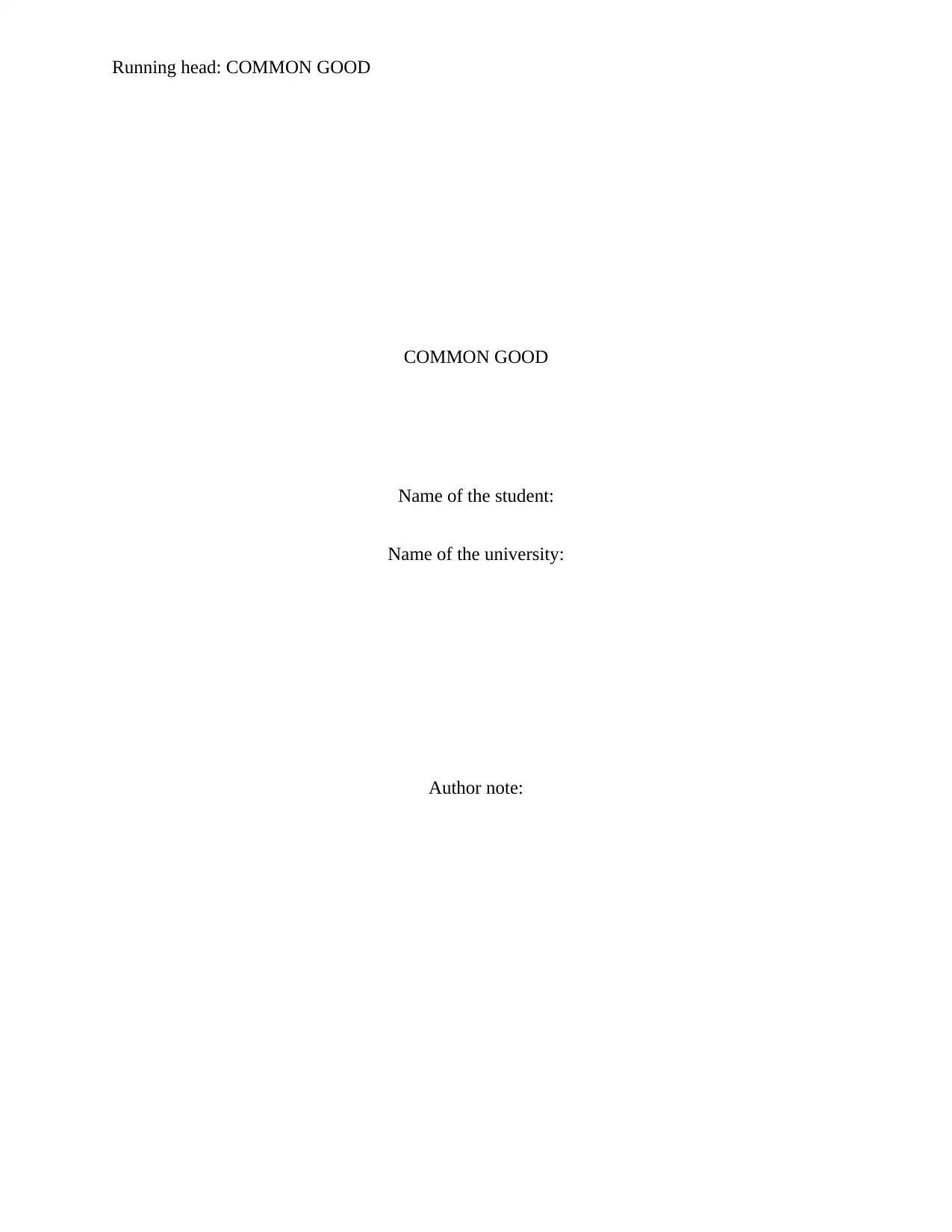
Running head: COMMON GOOD
COMMON GOOD
Name of the student:
Name of the university:
Author note:
COMMON GOOD
Name of the student:
Name of the university:
Author note:
Paraphrase This Document
Need a fresh take? Get an instant paraphrase of this document with our AI Paraphraser
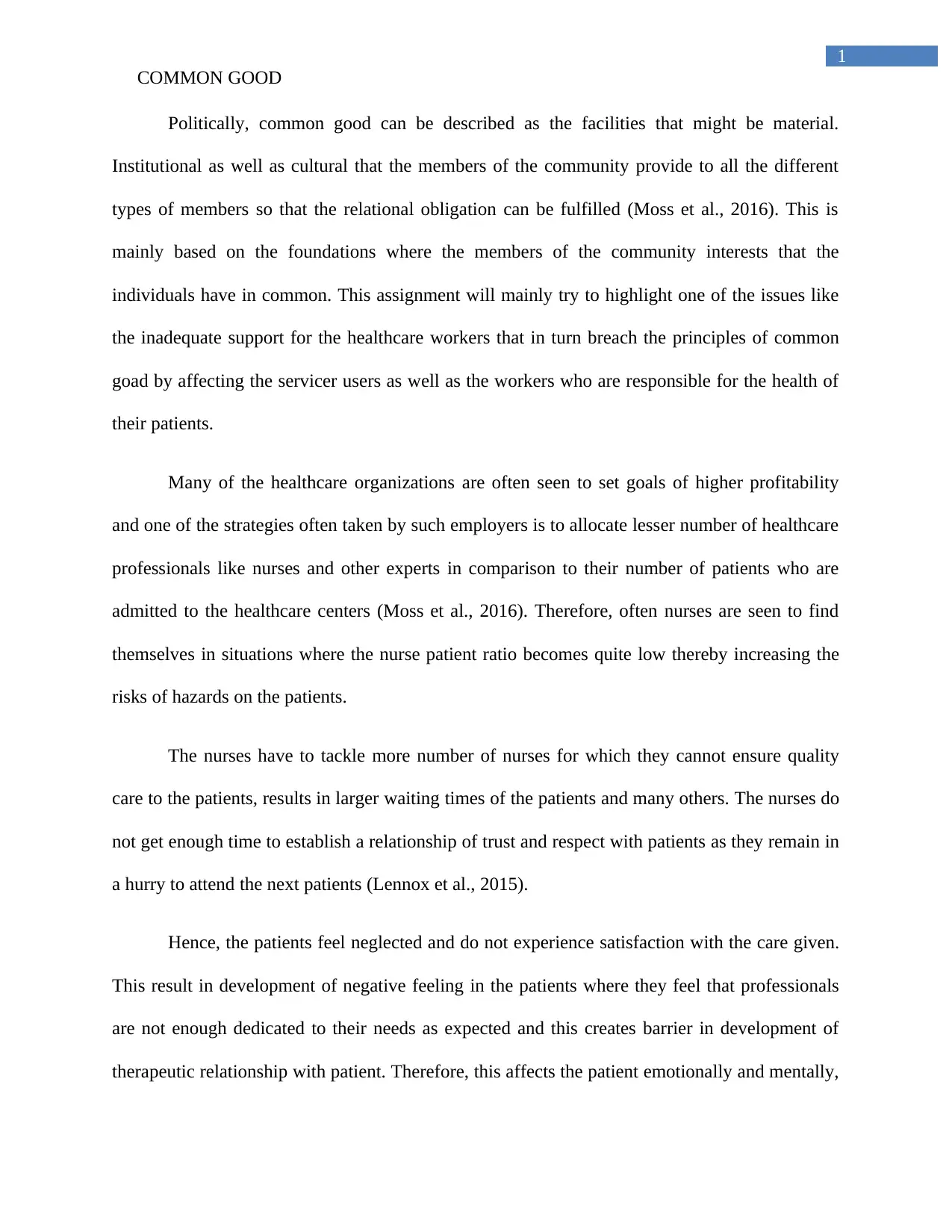
1
COMMON GOOD
Politically, common good can be described as the facilities that might be material.
Institutional as well as cultural that the members of the community provide to all the different
types of members so that the relational obligation can be fulfilled (Moss et al., 2016). This is
mainly based on the foundations where the members of the community interests that the
individuals have in common. This assignment will mainly try to highlight one of the issues like
the inadequate support for the healthcare workers that in turn breach the principles of common
goad by affecting the servicer users as well as the workers who are responsible for the health of
their patients.
Many of the healthcare organizations are often seen to set goals of higher profitability
and one of the strategies often taken by such employers is to allocate lesser number of healthcare
professionals like nurses and other experts in comparison to their number of patients who are
admitted to the healthcare centers (Moss et al., 2016). Therefore, often nurses are seen to find
themselves in situations where the nurse patient ratio becomes quite low thereby increasing the
risks of hazards on the patients.
The nurses have to tackle more number of nurses for which they cannot ensure quality
care to the patients, results in larger waiting times of the patients and many others. The nurses do
not get enough time to establish a relationship of trust and respect with patients as they remain in
a hurry to attend the next patients (Lennox et al., 2015).
Hence, the patients feel neglected and do not experience satisfaction with the care given.
This result in development of negative feeling in the patients where they feel that professionals
are not enough dedicated to their needs as expected and this creates barrier in development of
therapeutic relationship with patient. Therefore, this affects the patient emotionally and mentally,
COMMON GOOD
Politically, common good can be described as the facilities that might be material.
Institutional as well as cultural that the members of the community provide to all the different
types of members so that the relational obligation can be fulfilled (Moss et al., 2016). This is
mainly based on the foundations where the members of the community interests that the
individuals have in common. This assignment will mainly try to highlight one of the issues like
the inadequate support for the healthcare workers that in turn breach the principles of common
goad by affecting the servicer users as well as the workers who are responsible for the health of
their patients.
Many of the healthcare organizations are often seen to set goals of higher profitability
and one of the strategies often taken by such employers is to allocate lesser number of healthcare
professionals like nurses and other experts in comparison to their number of patients who are
admitted to the healthcare centers (Moss et al., 2016). Therefore, often nurses are seen to find
themselves in situations where the nurse patient ratio becomes quite low thereby increasing the
risks of hazards on the patients.
The nurses have to tackle more number of nurses for which they cannot ensure quality
care to the patients, results in larger waiting times of the patients and many others. The nurses do
not get enough time to establish a relationship of trust and respect with patients as they remain in
a hurry to attend the next patients (Lennox et al., 2015).
Hence, the patients feel neglected and do not experience satisfaction with the care given.
This result in development of negative feeling in the patients where they feel that professionals
are not enough dedicated to their needs as expected and this creates barrier in development of
therapeutic relationship with patient. Therefore, this affects the patient emotionally and mentally,
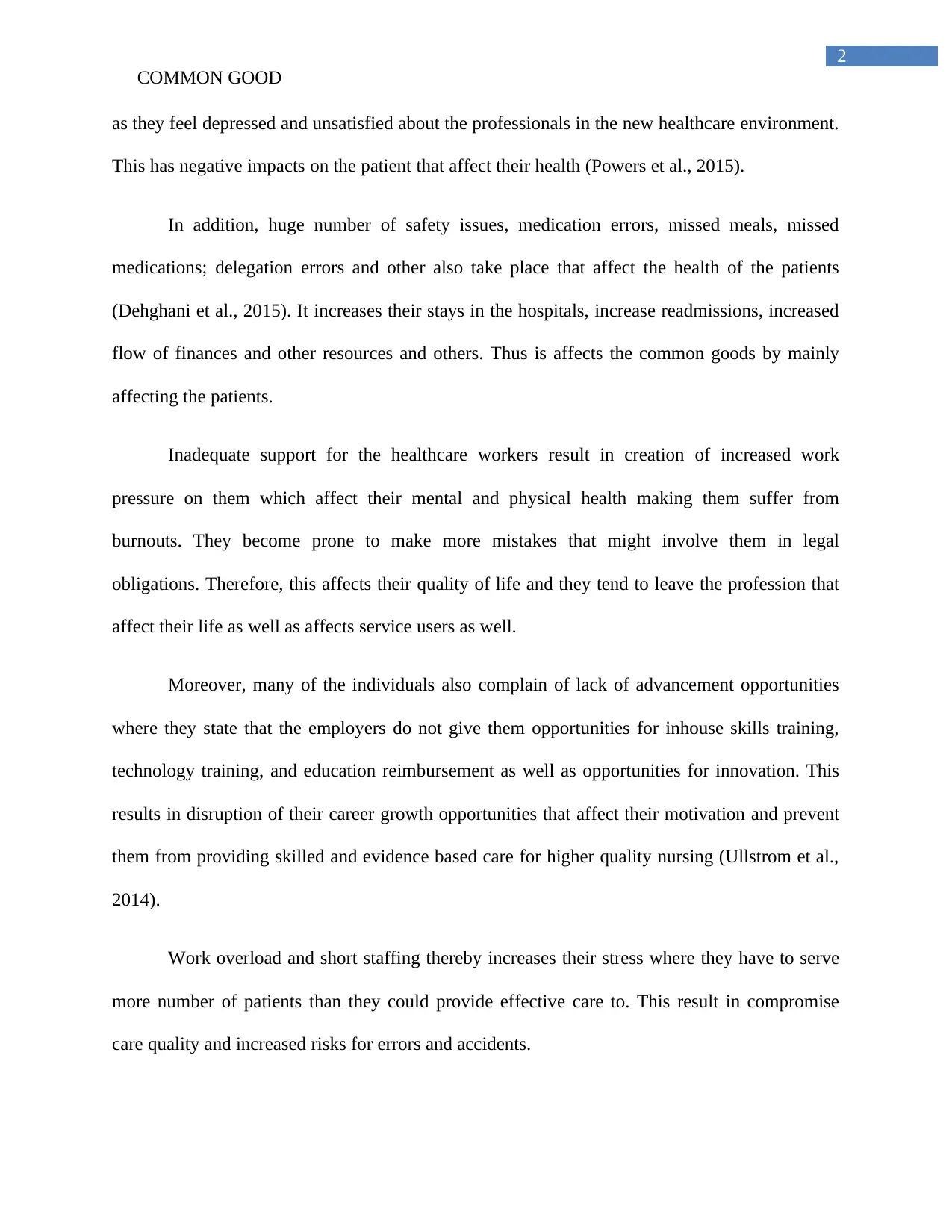
2
COMMON GOOD
as they feel depressed and unsatisfied about the professionals in the new healthcare environment.
This has negative impacts on the patient that affect their health (Powers et al., 2015).
In addition, huge number of safety issues, medication errors, missed meals, missed
medications; delegation errors and other also take place that affect the health of the patients
(Dehghani et al., 2015). It increases their stays in the hospitals, increase readmissions, increased
flow of finances and other resources and others. Thus is affects the common goods by mainly
affecting the patients.
Inadequate support for the healthcare workers result in creation of increased work
pressure on them which affect their mental and physical health making them suffer from
burnouts. They become prone to make more mistakes that might involve them in legal
obligations. Therefore, this affects their quality of life and they tend to leave the profession that
affect their life as well as affects service users as well.
Moreover, many of the individuals also complain of lack of advancement opportunities
where they state that the employers do not give them opportunities for inhouse skills training,
technology training, and education reimbursement as well as opportunities for innovation. This
results in disruption of their career growth opportunities that affect their motivation and prevent
them from providing skilled and evidence based care for higher quality nursing (Ullstrom et al.,
2014).
Work overload and short staffing thereby increases their stress where they have to serve
more number of patients than they could provide effective care to. This result in compromise
care quality and increased risks for errors and accidents.
COMMON GOOD
as they feel depressed and unsatisfied about the professionals in the new healthcare environment.
This has negative impacts on the patient that affect their health (Powers et al., 2015).
In addition, huge number of safety issues, medication errors, missed meals, missed
medications; delegation errors and other also take place that affect the health of the patients
(Dehghani et al., 2015). It increases their stays in the hospitals, increase readmissions, increased
flow of finances and other resources and others. Thus is affects the common goods by mainly
affecting the patients.
Inadequate support for the healthcare workers result in creation of increased work
pressure on them which affect their mental and physical health making them suffer from
burnouts. They become prone to make more mistakes that might involve them in legal
obligations. Therefore, this affects their quality of life and they tend to leave the profession that
affect their life as well as affects service users as well.
Moreover, many of the individuals also complain of lack of advancement opportunities
where they state that the employers do not give them opportunities for inhouse skills training,
technology training, and education reimbursement as well as opportunities for innovation. This
results in disruption of their career growth opportunities that affect their motivation and prevent
them from providing skilled and evidence based care for higher quality nursing (Ullstrom et al.,
2014).
Work overload and short staffing thereby increases their stress where they have to serve
more number of patients than they could provide effective care to. This result in compromise
care quality and increased risks for errors and accidents.
⊘ This is a preview!⊘
Do you want full access?
Subscribe today to unlock all pages.

Trusted by 1+ million students worldwide
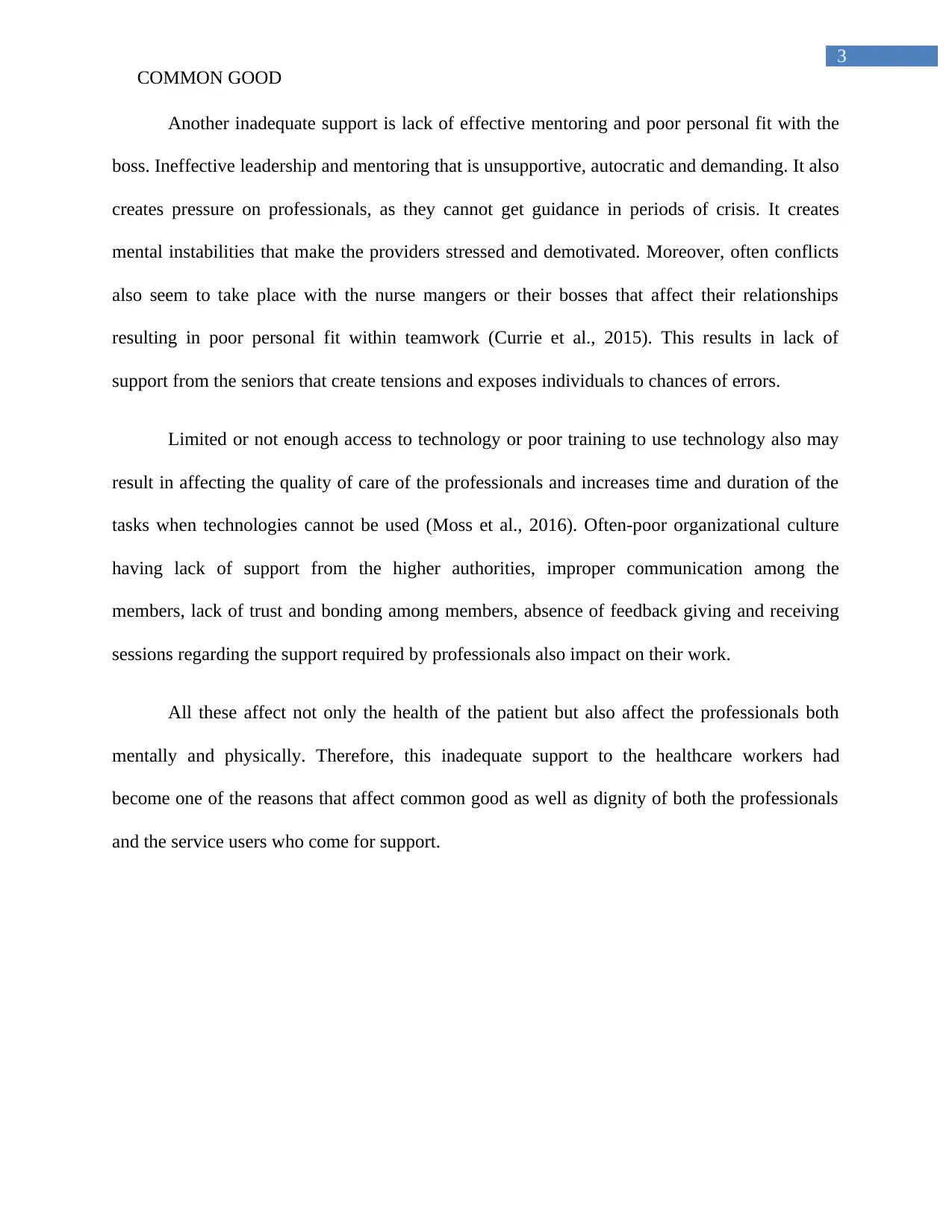
3
COMMON GOOD
Another inadequate support is lack of effective mentoring and poor personal fit with the
boss. Ineffective leadership and mentoring that is unsupportive, autocratic and demanding. It also
creates pressure on professionals, as they cannot get guidance in periods of crisis. It creates
mental instabilities that make the providers stressed and demotivated. Moreover, often conflicts
also seem to take place with the nurse mangers or their bosses that affect their relationships
resulting in poor personal fit within teamwork (Currie et al., 2015). This results in lack of
support from the seniors that create tensions and exposes individuals to chances of errors.
Limited or not enough access to technology or poor training to use technology also may
result in affecting the quality of care of the professionals and increases time and duration of the
tasks when technologies cannot be used (Moss et al., 2016). Often-poor organizational culture
having lack of support from the higher authorities, improper communication among the
members, lack of trust and bonding among members, absence of feedback giving and receiving
sessions regarding the support required by professionals also impact on their work.
All these affect not only the health of the patient but also affect the professionals both
mentally and physically. Therefore, this inadequate support to the healthcare workers had
become one of the reasons that affect common good as well as dignity of both the professionals
and the service users who come for support.
COMMON GOOD
Another inadequate support is lack of effective mentoring and poor personal fit with the
boss. Ineffective leadership and mentoring that is unsupportive, autocratic and demanding. It also
creates pressure on professionals, as they cannot get guidance in periods of crisis. It creates
mental instabilities that make the providers stressed and demotivated. Moreover, often conflicts
also seem to take place with the nurse mangers or their bosses that affect their relationships
resulting in poor personal fit within teamwork (Currie et al., 2015). This results in lack of
support from the seniors that create tensions and exposes individuals to chances of errors.
Limited or not enough access to technology or poor training to use technology also may
result in affecting the quality of care of the professionals and increases time and duration of the
tasks when technologies cannot be used (Moss et al., 2016). Often-poor organizational culture
having lack of support from the higher authorities, improper communication among the
members, lack of trust and bonding among members, absence of feedback giving and receiving
sessions regarding the support required by professionals also impact on their work.
All these affect not only the health of the patient but also affect the professionals both
mentally and physically. Therefore, this inadequate support to the healthcare workers had
become one of the reasons that affect common good as well as dignity of both the professionals
and the service users who come for support.
Paraphrase This Document
Need a fresh take? Get an instant paraphrase of this document with our AI Paraphraser
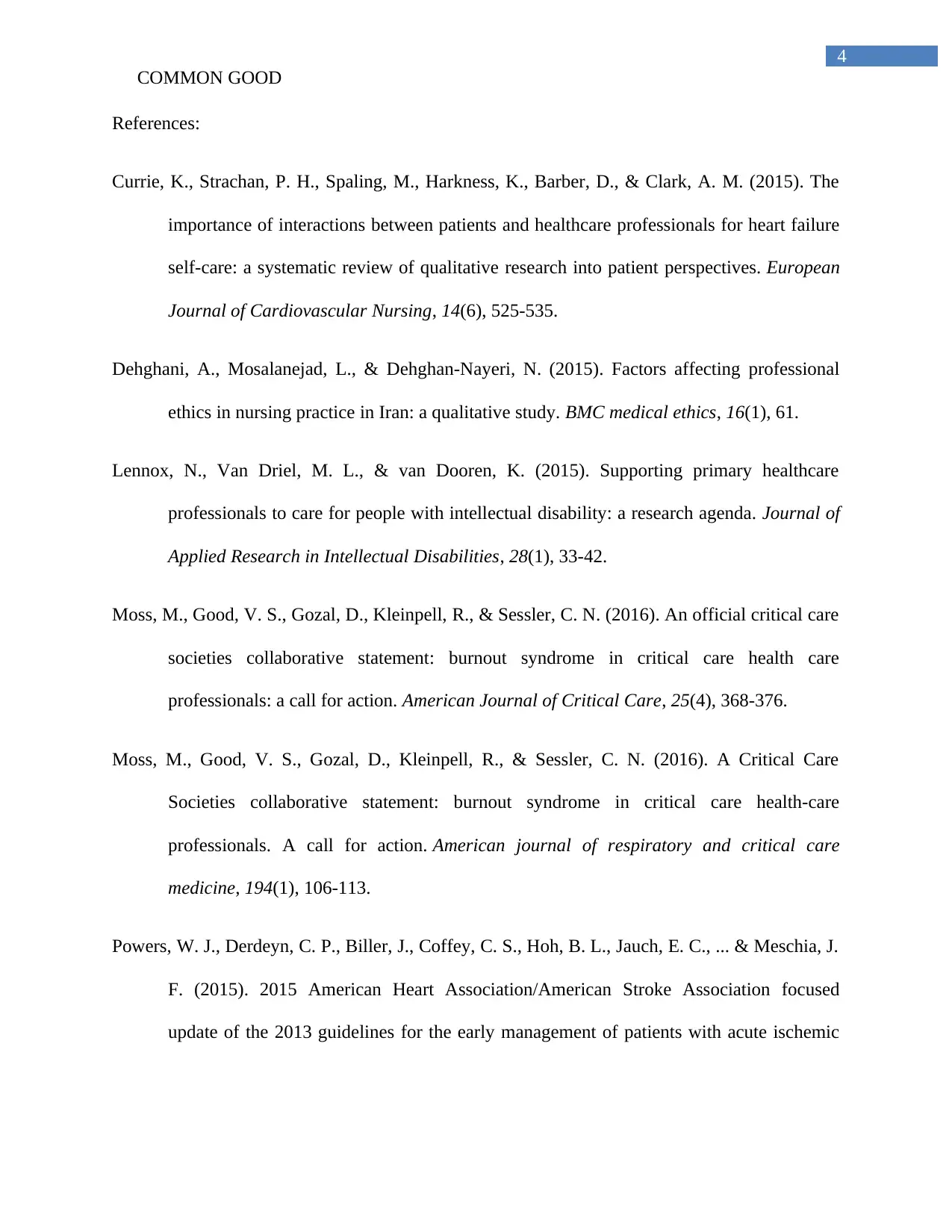
4
COMMON GOOD
References:
Currie, K., Strachan, P. H., Spaling, M., Harkness, K., Barber, D., & Clark, A. M. (2015). The
importance of interactions between patients and healthcare professionals for heart failure
self-care: a systematic review of qualitative research into patient perspectives. European
Journal of Cardiovascular Nursing, 14(6), 525-535.
Dehghani, A., Mosalanejad, L., & Dehghan-Nayeri, N. (2015). Factors affecting professional
ethics in nursing practice in Iran: a qualitative study. BMC medical ethics, 16(1), 61.
Lennox, N., Van Driel, M. L., & van Dooren, K. (2015). Supporting primary healthcare
professionals to care for people with intellectual disability: a research agenda. Journal of
Applied Research in Intellectual Disabilities, 28(1), 33-42.
Moss, M., Good, V. S., Gozal, D., Kleinpell, R., & Sessler, C. N. (2016). An official critical care
societies collaborative statement: burnout syndrome in critical care health care
professionals: a call for action. American Journal of Critical Care, 25(4), 368-376.
Moss, M., Good, V. S., Gozal, D., Kleinpell, R., & Sessler, C. N. (2016). A Critical Care
Societies collaborative statement: burnout syndrome in critical care health-care
professionals. A call for action. American journal of respiratory and critical care
medicine, 194(1), 106-113.
Powers, W. J., Derdeyn, C. P., Biller, J., Coffey, C. S., Hoh, B. L., Jauch, E. C., ... & Meschia, J.
F. (2015). 2015 American Heart Association/American Stroke Association focused
update of the 2013 guidelines for the early management of patients with acute ischemic
COMMON GOOD
References:
Currie, K., Strachan, P. H., Spaling, M., Harkness, K., Barber, D., & Clark, A. M. (2015). The
importance of interactions between patients and healthcare professionals for heart failure
self-care: a systematic review of qualitative research into patient perspectives. European
Journal of Cardiovascular Nursing, 14(6), 525-535.
Dehghani, A., Mosalanejad, L., & Dehghan-Nayeri, N. (2015). Factors affecting professional
ethics in nursing practice in Iran: a qualitative study. BMC medical ethics, 16(1), 61.
Lennox, N., Van Driel, M. L., & van Dooren, K. (2015). Supporting primary healthcare
professionals to care for people with intellectual disability: a research agenda. Journal of
Applied Research in Intellectual Disabilities, 28(1), 33-42.
Moss, M., Good, V. S., Gozal, D., Kleinpell, R., & Sessler, C. N. (2016). An official critical care
societies collaborative statement: burnout syndrome in critical care health care
professionals: a call for action. American Journal of Critical Care, 25(4), 368-376.
Moss, M., Good, V. S., Gozal, D., Kleinpell, R., & Sessler, C. N. (2016). A Critical Care
Societies collaborative statement: burnout syndrome in critical care health-care
professionals. A call for action. American journal of respiratory and critical care
medicine, 194(1), 106-113.
Powers, W. J., Derdeyn, C. P., Biller, J., Coffey, C. S., Hoh, B. L., Jauch, E. C., ... & Meschia, J.
F. (2015). 2015 American Heart Association/American Stroke Association focused
update of the 2013 guidelines for the early management of patients with acute ischemic
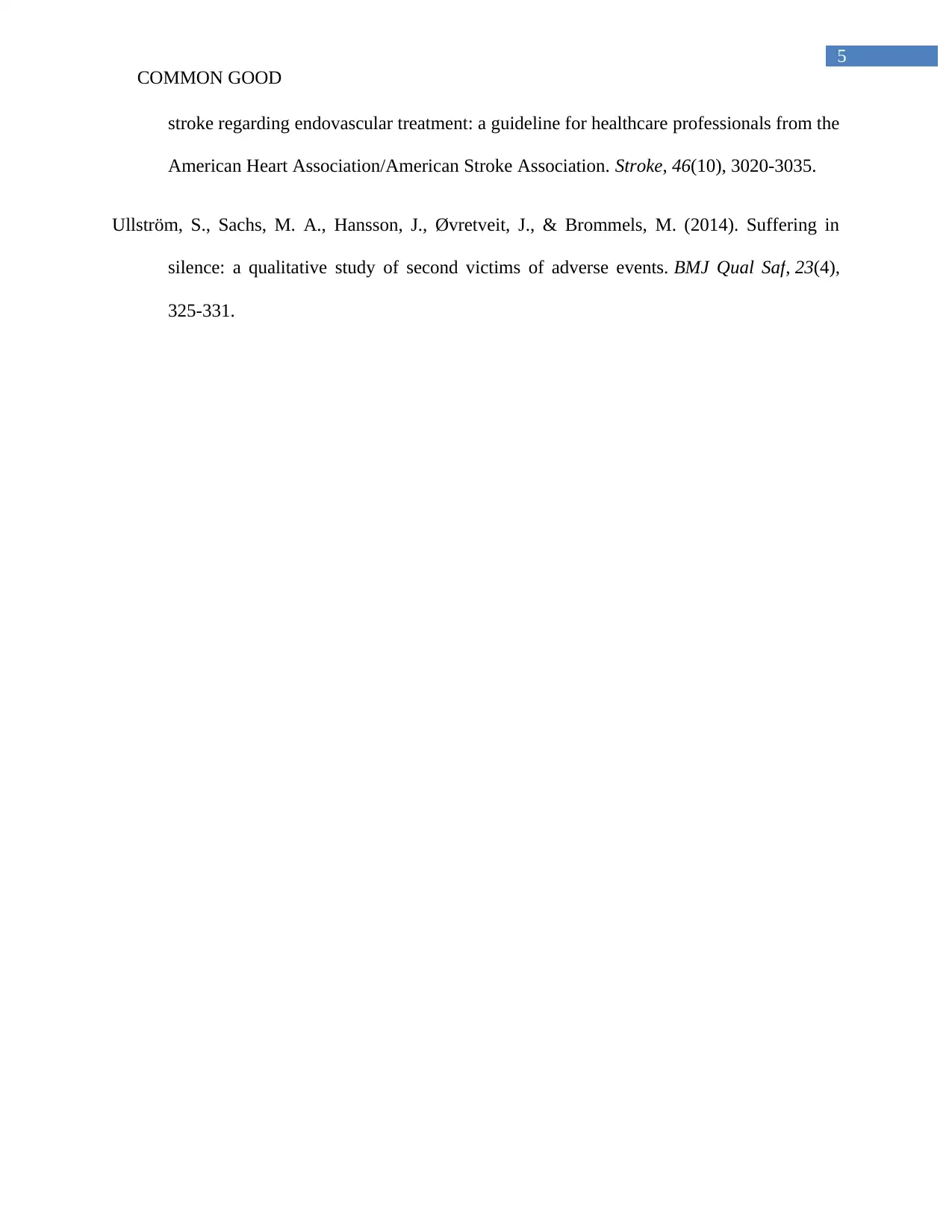
5
COMMON GOOD
stroke regarding endovascular treatment: a guideline for healthcare professionals from the
American Heart Association/American Stroke Association. Stroke, 46(10), 3020-3035.
Ullström, S., Sachs, M. A., Hansson, J., Øvretveit, J., & Brommels, M. (2014). Suffering in
silence: a qualitative study of second victims of adverse events. BMJ Qual Saf, 23(4),
325-331.
COMMON GOOD
stroke regarding endovascular treatment: a guideline for healthcare professionals from the
American Heart Association/American Stroke Association. Stroke, 46(10), 3020-3035.
Ullström, S., Sachs, M. A., Hansson, J., Øvretveit, J., & Brommels, M. (2014). Suffering in
silence: a qualitative study of second victims of adverse events. BMJ Qual Saf, 23(4),
325-331.
⊘ This is a preview!⊘
Do you want full access?
Subscribe today to unlock all pages.

Trusted by 1+ million students worldwide
1 out of 6
Related Documents
Your All-in-One AI-Powered Toolkit for Academic Success.
+13062052269
info@desklib.com
Available 24*7 on WhatsApp / Email
![[object Object]](/_next/static/media/star-bottom.7253800d.svg)
Unlock your academic potential
Copyright © 2020–2026 A2Z Services. All Rights Reserved. Developed and managed by ZUCOL.




